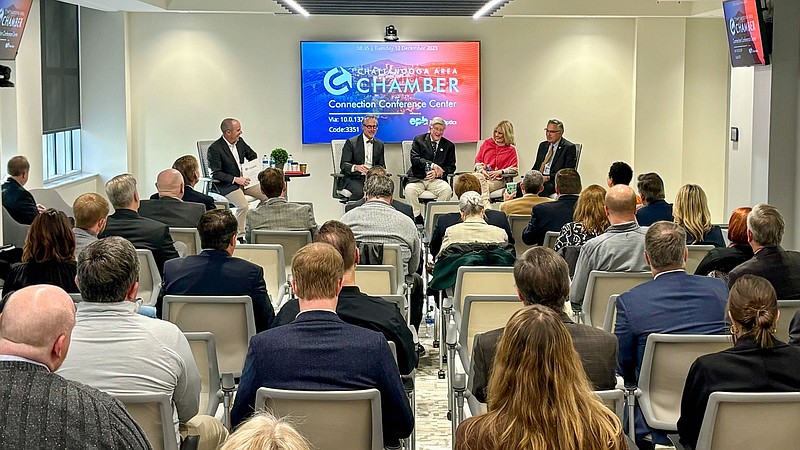Hamilton County lawmakers say they'll be focusing on education, infrastructure and making do with slowing revenue when they head to Nashville next month.
Sens. Todd Gardenhire, R-Chattanooga, and Bo Watson, R-Hixson, and Reps. Patsy Hazlewood, R-Signal Mountain, and Greg Vital, R-Harrison, outlined their priorities to members of the Chattanooga Chamber of Commerce on Tuesday morning in preparation for January's legislative session.
Gardenhire, chair of the Senate Judiciary Committee, said he expects "an enormous amount of national media" covering that committee because of calls for gun reform after the fatal March shooting at Nashville's Covenant School.
The day after the shooting, the senator pushed all gun-related bills in his committee to 2024. During a special session in August called to address the shooting, Gardenhire again deferred gun bills to next year.
"It was an extremely emotional session, nothing was going to get accomplished," he told chamber members Tuesday. "And if it was going to get accomplished, it wasn't going to be good. We would have to come back and redo it and probably face a lot of legal challenges."
Photo Gallery
Chattanooga-area lawmakers looking at education, transportation and budget ahead of session
Education
The lawmakers said they hope a panel considering rejecting federal money for Tennessee schools would have uncovered what kind of strings are attached to those dollars. That hasn't happened yet, they said, though the panel should present its findings to the legislature in January.
"A lot of us in the Senate didn't agree with the idea of forgoing federal funds for education," Gardenhire, who sits on the Senate Education Committee, said at Tuesday's panel.
Gardenhire has also pushed for taxpayer-funded private school vouchers, which Gov. Bill Lee is proposing to expand from three counties to all 95. Hazlewood said that for the vouchers to work, though, there needs to be the same kind of accountability for student performance in private schools as there is for public ones.
(READ MORE: How Gov. Lee's expanded school voucher program could affect Southeast Tennessee)
Rural counties without private schools nearby also don't stand to gain much from the voucher system, Gardenhire said.
Transportation
Tennessee's growth has made it hard for the state to keep up with its transportation infrastructure, Watson said.
In the last session, lawmakers passed $3.3 billion for transportation modernization after facing requests worth $26 billion, Vital, vice chair of the House Transportation Committee, said during Tuesday's panel. The Transportation Modernization Act created a state board that will look into adding paid express "choice lanes" to highways in partnership with private companies.
Daphne Kirksey, who works in external affairs for Tennessee American Water, said she wouldn't mind having the option of a paid express lane as long as those lanes are added to, not taking over, existing lanes. An electronic pass like ones used in Georgia or Florida would also make them easier to use, she said after the panel.
Lawmakers also talked about a $500,000 grant recently awarded to Chattanooga to study how to bring passenger rail service to the city. Vital called the money a step in the right direction.
Watson said there still needs to be a cultural shift toward adopting mass transit, which also typically requires government subsidies to be affordable for most residents.
"We like to drive our cars; we like to have the independence," Watson said. "That's been our culture — 'I don't want to go out and sit and wait on the sidewalk for the train or the bus to come by.'"
Budget
Watson and Hazlewood, who lead finance committees in the Senate and House, said they're looking at a leaner budget this year.
"It's not that the sky is falling, the state's running out of money, but it is that our revenue collections have slowed down," Hazlewood said during Tuesday's panel. "Basically if we want to do something new, we have to look at doing away with something old .... That's not a bad thing, but it is a different thing than we have been in."
Costs for TennCare, schools and the Department of Correction have grown naturally, Watson said.
Lawmakers will hear a proposal to eliminate Tennessee's tax on groceries, something residents got a taste of during a three-month sales tax holiday this year. But Watson said tax is the most stable revenue source for the state, bringing in about $1 billion a year.
"I think that's part of what makes our state attractive to a lot of people moving here, because of lower taxes," Kirksey said after the panel. "I think it has contributed to our economic health here."
Contact Ellen Gerst at egerst@timesfreepress.com or 423-757-6319.

